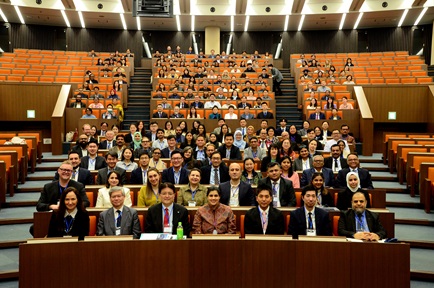Talent in the age of Innovation
If Singapore’s economy in its first 50 years could be described as an age of industrialisation, driven by technical professionals, managers and technocrats, the next half-century will witness an age of innovation..
By Chan Kim Yin, Marilyn A. Uy & Ringo Ho

If Singapore’s economy in its first 50 years could be described as an age of industrialisation, driven by technical professionals, managers and technocrats, the next half-century will witness an age of innovation requiring a mix of entrepreneurial talent alongside professional/technical and managerial/leadership skills.
For organisations and corporations seeking to thrive in this knowledge-based, innovation-driven economy, there is a pressing need to identify and nurture employees who have shown a flair for innovation by offering new and useful ideas, processes or products. And when it comes to innovation, two types of employees come to mind: The entrepreneur and the intrapreneur.
Entrepreneurs, according to economist Joseph Schumpeter who first highlighted their importance in the 1930s, are individuals who tend to take the risk and initiative to start their own firms and businesses outside of the security and stability of large organisations or corporations.
Intrapreneurs, on the other hand, are “corporate innovators” or organisational employees who tend to behave like entrepreneurs while working in organisations, said businessman and inventor Gifford Pinchot who coined the term in the late 70s.
In 1985, Steve Jobs further popularised the concept of intrapreneurship when the Apple co-founder wrote in a Newsweek article: “The Macintosh team was what is commonly known as intrapreneurship... a group of people going, in essence, back to the garage, but in a large company.”
The Macintosh team comprised a group of Apple Computer engineers who were handpicked by Jobs to create the Macintosh Computer (better known as the Mac). Under Jobs’ personal leadership, the Mac group operated as an independent unit without any interference from anyone else in the company.
In organisational terms, one tends to think of Jobs as a rebel because of his entrepreneurial instincts. Our own research has shown that people who aspire to be entrepreneurs tend not to seek highly professional or technical careers. We also found that those who are motivated to lead may not necessarily want to be entrepreneurs but instead prefer to seek bureaucratic or managerial roles in organisations.
If it is true that traditional organisations, such as hospitals, banks, manufacturing outlets and military/security outfits, tend to attract people with more leadership/administrative and technical/professional career motivations — rather than those with entrepreneurial aspirations — then what does this mean for organisations that seek to thrive in an age where innovation is the key to sustainable organisational success? Can a traditional, professional or bureaucratic organisation find and nurture, among their employees, those who want to be intrapreneurs?
In 2017, our research sought to find answers to “who wants to be an intrapreneur” in traditional organisations by surveying over 400 employees in various Singaporean public sector research and healthcare organisations. Specifically, we wanted to establish whether intrapreneurial motivation could be measured distinctly from entrepreneurial, professional and leadership (EPL) career motivations among working employees. We also wanted to ascertain whether those motivated to be intrapreneurs were only individuals with entrepreneurial mindsets.
The study involved the volunteer research participants who were organisational employees completing an online survey to measure their EPL career motivations, as well as their intrapreneurial motivation.
Among other things, the survey required participants to indicate the extent they concurred or otherwise — on a scale from 1 (strongly disagreed) to 5 (strongly agreed) — with a total of 36 different statements; nine each to reflect individual interest and motivation to engage in entrepreneurial, professional, leadership and intrapreneurial actions respectively in their organisations.
These included statements such as “I feel a need to actively contribute to the development of new products and services”; “I am the type of person that is best suited to be an entrepreneur”; “Being a respected professional will assure me a steady income, prestige and status in society”; “I have always enjoyed leading others and would assume leadership roles whenever I could.”
Our findings showed that intrapreneurial motivation could be measured distinctly from entrepreneurial, professional, leadership career motivations.
Surprisingly, we found that high career motivations in the entrepreneurial, professional and leadership areas were added to predict the motivation to innovate for one’s organisations. In contrast, individuals who were low on entrepreneurial, professional and leadership motivations were the least motivated to be intrapreneurs.
The research findings suggest that for organisations seeking to innovate, their human resource policy should define the space for “talent” in all three dimensions of EPL excellence. They should invest in identifying and developing their human capital in all three — “E”, “P” and “L” — areas, instead of seeking or nurturing only those employees with leadership or technical (professional) qualities.
Likewise, intrapreneurship training and development should not be limited only to those who are entrepreneurially inclined since intrapreneurs can also be found among employees with strong leadership and professional motivations as well.
Our study suggests that people with highly developed technical expertise, whose tolerance for risk may lead them to avoid entrepreneurial pursuits, are nevertheless motivated to innovate in intrapreneurial roles. Thus, training programmes to motivate technical experts to embrace entrepreneurial and leadership pursuits can have a payoff in terms of sharpening their intrapreneurial instincts.
Accenture, a leading global professional services company in Belgium which provides services and solutions in areas such as consulting, digital, technology & operations, is one company which has been actively involved in encouraging intrapreneurship among its employees.
Under its “innovation challenge” programme, teams are encouraged to submit innovative ideas, and they will be assisted by industry and technology experts to develop their ideas. One of the winning teams from the programme in 2015 even went on to launch its own start-up, which offers an online platform for people who want to sell homemade meals around their neighbourhood.
In this fast-paced era of creative destruction, the keyword for organisations should be “and”, not “or”, where an employee’s combined EPL motivations could well produce an innovation, such as the development of a new technology, or even an organisational change to transform a bloated business into a nimble-footed outfit that is attuned to the needs and demands of the times.
About the authors
Chan Kim Yin and Marilyn A. Uy are associate professors of strategy, management & organisation at Nanyang Business School. Ringo Ho is associate professor at the School of Social Sciences at NTU Singapore. You may read their research published in Frontiers in Psychology at URL: https://www.frontiersin.org/articles/10.3389/fpsyg.2017.02041/full
This commentary was published in The Business Times on 28 August 2018 and The New Paper on 30 August 2018.







